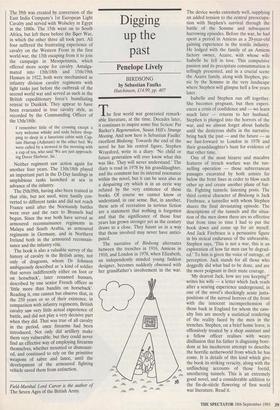Digging up the past
Penelope Lively
BIRDSONG The first world war generated remark- able literature, at the time. Decades later, it continues to inspire some fine fiction: Pat Barker's Regeneration, Susan Hill's Strange Meeting. And now here is Sebastian Faulks' excellent Birdsong. Towards the end of the novel he has his central figure, Stephen Wraysford, write in a diary: 'No child or future generation will ever know what this was like. They will never understand.' The diary is read in 1978 by his granddaughter, and the comment has its internal resonance within the novel, but it can be seen also as a despairing cry which is in an eerie way refuted by the very existence of these books. Of course we cannot know or understand, in one sense. But, in another, these acts of recreation in serious fiction are a statement that nothing is forgotten and that the significance of those four years has grown stronger yet as the century draws to a close. They haunt us in a way that those involved may never have antici- pated. The narrative of Birdsong alternates between the trenches in 1916, Amiens in 1910, and London in 1978, when Elizabeth, an independently minded young fashion designer, becomes suddenly obsessed with her grandfather's involvement in the war. The device works extremely well, supplying an added tension to the central preoccupa- tion with Stephen's survival through the battle of the Somme and subsequent harrowing episodes. Before the war, he had spent a period in Amiens as a 20-year-old gaining experience in the textile industry. He lodged with the family of an Amiens factory owner, Azaire, with whose wife Isabelle he fell in love. This compulsive passion and its precipitate consummation is tellingly presented, and in a crucial scene the Azaire family, along with Stephen, pic- nic by the Somme in the very landscape where Stephen will glimpse hell a few years later.
Isabelle and Stephen run off together. She becomes pregnant, but then experi- ences a crisis of confidence and — we learn much later — returns to her husband. Stephen is plunged into the horrors of the war, and we almost forget about Isabelle until the dexterous shifts in the narrative bring back the past — and the future — as we fast-forward to London in 1978 and their granddaughter's hunt for evidence of that other time.
One of the most bizarre and macabre features of trench warfare was the tun- nelling operation — those subterranean passages excavated by both armies far below the front lines in order to blow each other up and create another plane of bat- tle. Fighting tunnels; listening posts. The third central character of Birdsong is Jack Firebrace, a tunneller with whom Stephen shares the final devastating episode. The descriptions of the tunnels and the situa- tion of the men down there are so effective that from time to time I had to put the book down and come up for air myself. And Jack Firebrace is a persuasive figure in his stoical endurance of the unbearable. Stephen says, 'This is not a war, this is an exploration of how far men can be degrad- ed.' To him is given the voice of outrage, of perception. Jack stands for all those who doggedly did what had to be done, and are the more poignant in their mute courage.
`My dearest Jack, how are you keeping?' writes his wife — a letter which Jack reads after a searing experience underground, in one of the novel's shockingly acute juxta- positions of the surreal horrors of the front with the innocent incomprehension of those back in England for whom the casu- alty lists are merely a statistical rendering of the reality faced by the men in the trenches. Stephen, on a brief home leave, is offensively treated by a shop assistant and a fellow officer realises with weary disillusion that his father is disguising bore- dom at his incoherent attempt to describe the horrific netherworld from which he has come. It is details of this kind which give the book its striking veracity, along with the unflinching accounts of those foetid, smothering tunnels. This is an extremely good novel, and a considerable addition to the fin-de-siècle flowering of first world war literature. Read it.


































































 Previous page
Previous page